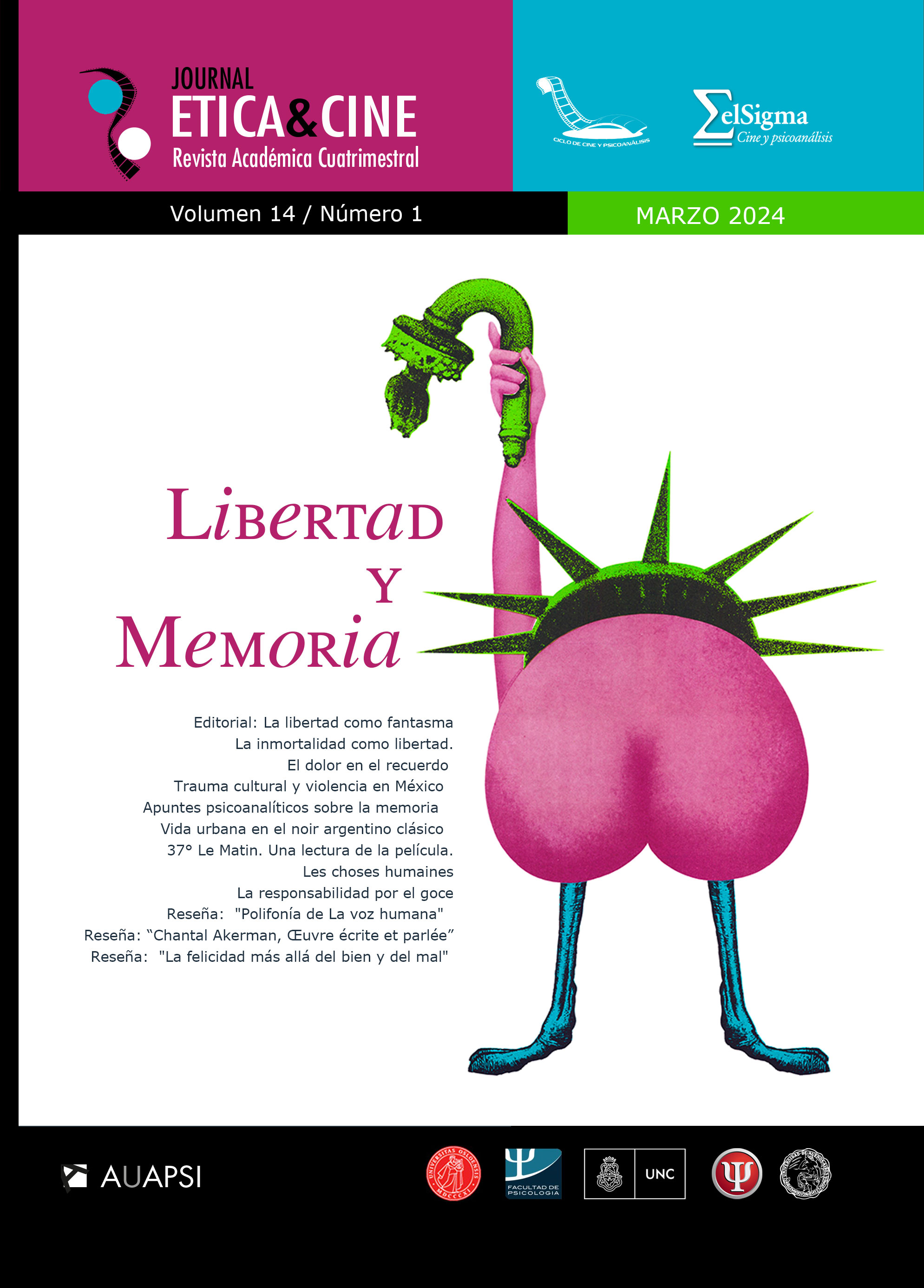Pain in memory: memory, politics and aesthetics in the feature film Hannah Arendt (2012), by Margarethe von Trotta
DOI:
https://doi.org/10.31056/2250.5415.v14.n1.44631Keywords:
Hannah Arendt, Margarethe von Trotta, Otherness, Holocaust, Memory studiesAbstract
Hannah Arendt’s influence on twentieth and twenty-first century thought is beyond doubt. Her ability to interrelate politics and the ways in which a given society establishes relations between individuals within the public space with the relations of power and domination that also develop within a given community has been of great relevance in order to approach, from reflection and the need to recognize ourselves in the past, some of the most dramatic events that have occurred in the history of mankind. Her courage to study the Jewish Holocaust in a straight way, and to try to understand how the death of so many millions of people could be undertake in a mechanical and organized way reflects the capacity of this thinker not only to approach the other, the different, but to try to maintain a memory of the past that serves as a framework of understanding to replace, facing the present, the confrontation between enemies by a dialectic between adversaries. In this paper, we will try to present how Arendt’s work interrelates with her aesthetics, through the analysis of memory and otherness. To do so, we will analyze how these aspects are presented to the viewer in Margarethe von Trotta’s feature film Hannah Arendt (2012).
Downloads
References
Arendt, H. (1958). The Origins of Totalitarianism. Meridian Books.
Assmann, A. (2010). “Canon and Archive”. En A. Erll y A. Nünning (eds.) (2010). A Companion to Cultural Memory Studies (pp. 97-107). De Gruyer.
Bauman, Z. (2017). Retropia. Polity Press.
Bayer, R. (1965). Historia de la Estética. Fondo de Cultura Económica.
Biskowski, L.J. (1995). Politics versus Aesthetics: Arendt’s Critiques of Nietzsche and Heidegger. The Review of Politics, 57, 59-89.
Corcoran, P. (2008). Political Recognition and Æsthetic Judgement. Theoria, 115, 64-90.
Eagleton, T. (1990). La Estética como ideología. Trotta.
Erll, A. (2010). Literature, Film, and the Mediality of Cultural Memory. En A. Erll y A. Nünning (eds.) A Companion to Cultural Memory Studies (pp. 389-398). De Gruyer.
Erll, A. (2011). Memory in culture. Palgrave Macmillan.
Gombrich, E. (1993). Historia del arte. Editorial Diana.
Hartog, F. (2003). Régimes d’historicité. Éditions du Seuil.
Hartmann, N. (1977). Estética. Universidad Nacional Autónoma de México.
Heidegger, M. (1971). El ser y el tiempo. Fondo de Cultura Económica.
Kateb, G. (1977). Freedom and Worldliness in the Thought of Hannah Arendt. Political Theory, 5, 141-182.
Klusmeyer, D. (2009). Beyond Tragedy: Hannah Arendt and Hans Morgenthau on Responsibility, Evil and Political Ethics. International Studies Review, 11, 332-351.
Levy, D. y Sznaider, N. (2002). Memory Unbound. The Holocaust and the Formation of Cosmopolitan Memory. European Journal of Social Theory, 5, 87-106.
Livingstone, D. (2016). Paradoxes of Dehumanization. Social Theory and Practice, 42, 416-443.
Maoz, I. y McCauley, C. (2008). Threat, Dehumanization, and Support for Retaliatory Aggressive Policies in Asymmetric Conflict. The Journal of Conflict Resolution, 52, 93-116.
Neumann, B. (2010). The Literary Representation of Memory. En A. Erll y A. Nünning (eds.) A Companion to Cultural Memory Studies (pp 333-343). De Gruyer.
Jay, M. (1992). “The Aesthetic Ideology” as Ideology; Or, What Does It Mean to Aestheticize Politics? Cultural Critique, 21, 41-61.
Jiménez, J. (2002). Teoría del arte. Tecnos.
Olick, J. K., Vinitzky-Seroussi, V. y Levy, D. (2011). The Collective Memory Reader. Oxford University Press.
Plazaola, J. (2007). Introducción a la Estética. Universidad de Deusto.
Said, E. (2010). Orientalismo. Debolsillo.
Traverso, E. (2017). Left-Wing Melancholia. Columbia University Press.
Winter, J. (2010). Sites of Memory and the Shadow of War. En A. Erll y A. Nünning (eds.) A Companion to Cultural Memory Studies (pp. 61-74). De Gruyer.
Zapata-Barrero, R. (2008). Multiculturalidad, inmigración y democracia. En F. Quesada (ed.). Ciudad y ciudadanía (pp. 253-277). Trotta.
Downloads
Published
How to Cite
Issue
Section
License
Copyright (c) 2024 Ética y Cine Journal

This work is licensed under a Creative Commons Attribution-ShareAlike 4.0 International License.
Los autores que publiquen en Ética y Cine Journal aceptan las siguientes condiciones:
Los autores/as conservan los derechos de autor © y permiten la publicación a Ética y Cine Journal, bajo licencia CC BY-SA / Reconocimiento - Reconocimiento-CompartirIgual 4.0 Internacional. La adopción de esta licencia permite copiar, redistribuir, comunicar públicamente la obra, reconociendo los créditos de la misma, y construir sobre el material publicado, debiendo otorgar el crédito apropiado a través de un enlace a la licencia e indicando si se realizaron cambios.

Este obra está bajo una licencia de Creative Commons Reconocimiento-CompartirIgual 4.0 Internacional.




